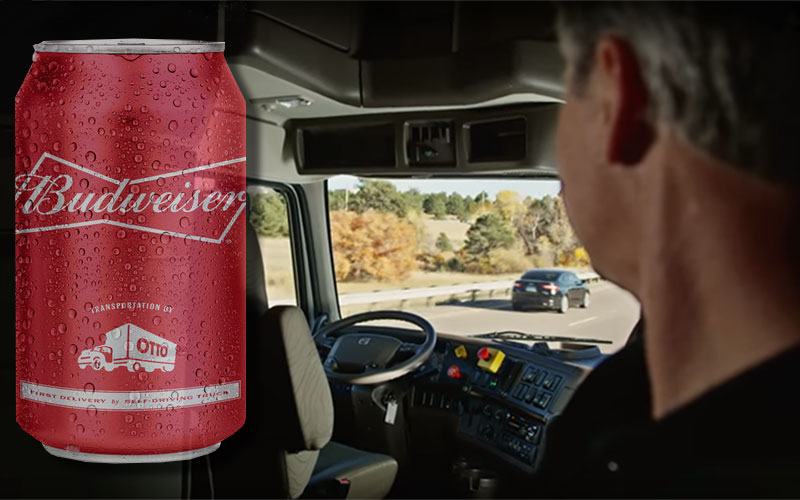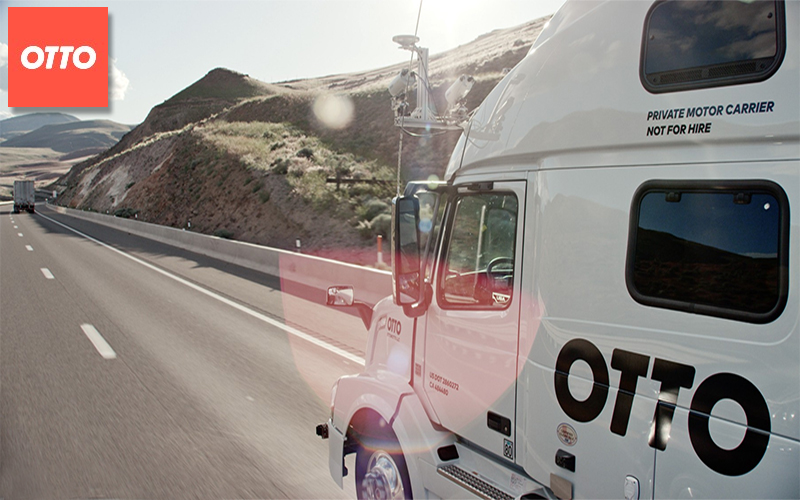Uber’s Otto Self-Driving Autonomous Truck Makes It’s First (Budweiser Beer) Run

The world's first shipment by a self-driving truck included 51,744 cans of Budweiser beer, with a tractor-trailer outfitted with Otto's self-driving kit hauling the beer 120 miles along Colorado's Interstate 25 on Oct. 20.
While widespread usage of self-driving autonomous trucks is not upon us yet, it appears that things are now officially in the very early innings.
And the reason is….(Budweiser) beer.
OK, well, that is stretching it but maybe I have your attention now, grin.
And the main party responsible for this development is the ubiquitous ride-sharing service Uber.
Uber’s recent acquisition of self-driving truck startup company Otto last August turned a lot of heads in the trucking and logistics sectors, and this week it officially began to do the same over the road, hauling more than 50,000 cans, 51,744 to be exact, of Budweiser in Colorado from Fort Collins, through downtown Denver, to Colorado Springs, for a 120-mile haul, which Otto said represents the completion of the world’s first shipment by a self-driving truck.
“By using cameras, radar, and lidar sensors mounted on the vehicle to ‘see’ the road, Otto’s system controlled the acceleration, braking, and steering of the truck to carry the beer exit-to-exit without any human intervention,” stated a company blog post.
“In fact, our professional driver was out of the driver’s seat for the entire 120-mile journey down I-25, monitoring the self-driving system from the sleeper berth in the back.”
And the company added that this shipment marks the next step towards its vision for a safe and productive future across U.S. highways, explaining that with an Otto-equipped vehicle, truck drivers will have the opportunity to rest during long stretches of highway while the truck continues to drive and make money for them.
While there are many pros and cons to the self-driving truck debate, some anecdotal and some on the record, one cannot overlook the fact that this week’s development really is a big deal, although it may be too early still to officially call it a game changer.
But depending on where things go from here, I reserve the right to reverse that sentiment (it’s my column, after all).
Even though this development marks the true first time a driverless truck has hauled an actual shipment, Uber is far from alone in its desire to bring this to the masses and make it commercially available and viable.
As Logistics Management Contributing Editor John Schulz noted in a 2015 report, some of the world’s biggest corporations - Apple, Google, Daimler-Benz and countless others - are behind the fast-moving technology that is pushing driverless vehicles.
Read: Possibility of Driverless Trucks Offers Hope for Truck Driver Crisis
Currently now well beyond the initial testing phase, driverless trucks hold promising technology that can increase highway safety, reduce human error and perhaps ease the chronic driver shortage plaguing the trucking industry.
But that also comes with some built-in obstacles, too.
And as with other fast-moving technologies, however, trucking leaders say the regulatory system regulating driverless vehicles is lagging behind the science breakthroughs surrounding these vehicles.
“I do not think driverless trucks are a pie in the sky,” said John White, chief marketing officer for U.S. Xpress, the nation’s seventh-largest truckload carrier.
“But the legislative landscape in Washington will be the biggest limiting factor, in my opinion. I think the technology will be readily developed before we have the willingness to pass legislation to make it commercially viable.”
And that could be the rub, at least for now.
Obviously hurdles remain. What happens in an accident? Who is legally liable? The company? The computer programmer? The shipper? And there are many regulatory hurdles to clear.
But if proven safe, the idea of driverless trucks raises intriguing possibilities, Schulz wrote.
After all, driverless trucks wouldn’t be covered by hours of service driving limits. They would not abuse alcohol or drugs. They wouldn’t quit in the middle of a run. And they wouldn’t text while driving.
In any event, Uber and Otto are committed to making their presence felt in both the linehaul and brokerage markets.
And this week’s initial “suds” haul marks a significant first step, which should be recognized and noted for sure.
SC24/7 Search Term: Autonomous Trucking
Related: Turning Truckers into Self-Driving Freight Haulers
Article Topics
DHL Supply Chain News & Resources
Orchestration: The Future of Supply Chain Port of Baltimore Could Reopen in May, Says DHL Executive DHL Express and Standard Chartered to Cut Carbon Emissions DHL Supply Chain Deploys Cobot to Optimize Picking Process Hitting the Right Notes in the Supply Chain Supply Chain Digitalization Trends for 2024 and Beyond DHL Supply Chain and AutoStore announce partnership expansion More DHL Supply ChainLatest in Transportation
Talking Supply Chain: Doomsday never arrives for Baltimore bridge collapse impacts Amazon Logistics’ Growth Shakes Up Shipping Industry in 2023 Nissan Channels Tesla With Its Latest Manufacturing Process Why are Diesel Prices Climbing Back Over $4 a Gallon? Luxury Car Brands in Limbo After Chinese Company Violates Labor Laws The Three Biggest Challenges Facing Shippers and Carriers in 2024 Supply Chain Stability Index: “Tremendous Improvement” in 2023 More TransportationAbout the Author
















